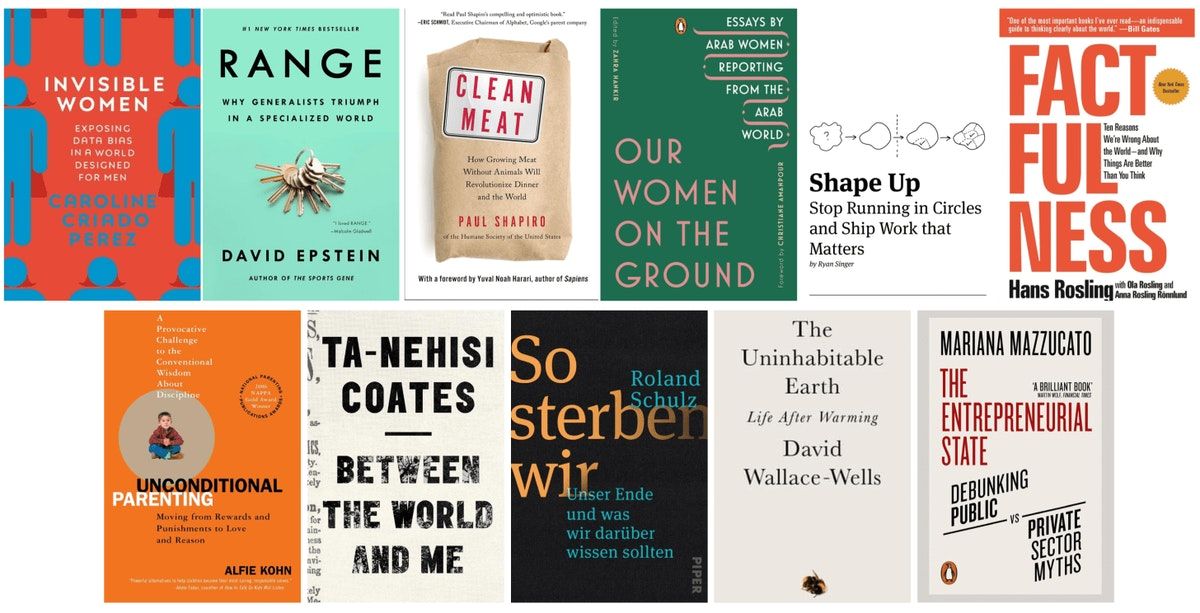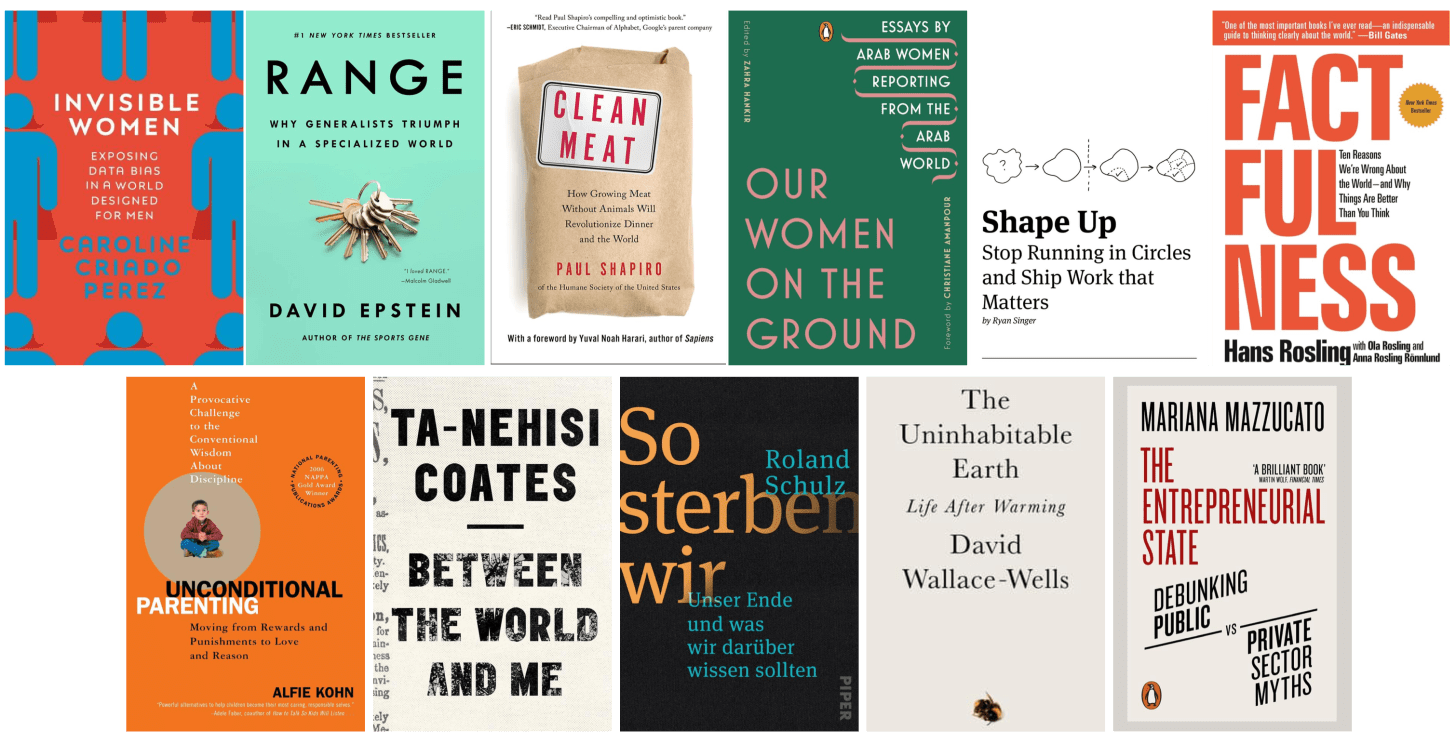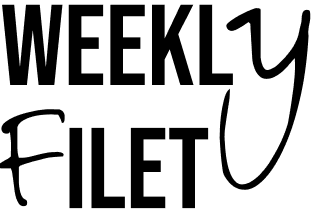11 books that have inspired me in 2019


Invisible Women (Caroline Criado-Perez)
I have recommended this book countless times already and I will continue to tell everyone, especially men, to read it. It explains how women are discriminated against in a world that is still mostly made for and by men. It’s full of illuminating, shocking examples of disadvantages women face – not because someone actively decided to do so, but because women are simply forgotten. It sounds absurd, but Criado-Perez has plenty of examples to show the severe consequences it has, sometimes even deadly.
You can buy these and all other books I’ve read in 2019 right here
The Uninhabitable Earth (David Wallace-Wells)
An eye-opener. The book is very heavy on numbers, a bit too much for my taste (yes, even for my numbers-accustomed taste). Then again, his main message comes across crystal clear: Things are worse that you might think. 2 degree warming is not a worst case scenario, but more likely a best case scenario. The second key learning from this book is the sheer breadth and magnitude of effects climate change will have, way beyond the obvious ones like heat and sea level rise. If you prefer a shorter version than the book, you can read this article by the author in New York Magazine.
Range: How Generalists Triumph in a Specialized World (David Epstein)
I very important book to me personally. I’ve always struggled with the fact that I have no one thing that I’m really, really good at. Instead, I’m fairly confident that I have a broader range of skills that I’m above average at than others, a broader range of topics I know a little something about. That’s great, but it’s sometimes hard to see where exactly to go with that. Epstein’s book has helped me embrace the generalist in me, rather than just accepting it.
Unconditional Parenting (Alfie Kohn)
I’m still digesting the key message: You should not praise your kid. Kohn argues that – on a fundamental level – praising has the same effect on a kid as punishing has. You communicate (by positive or negative reinforcement) that your love is conditional on him or her acting the way you approve of. As you condition the child to act in line with what you want, it becomes focused on the effects her actions have for herself, rather than for others. If you praise your child for sharing a cookie with her friend, she might do it again – but not because she understands that it’s a nice thing to do, but because she will seek that praise again.
Factfulness (Hans Rosling)
A book full of insights that will make you feel good and bad at the same time. Bad, because your perception of the world is spectacularly and embarrassingly wrong in many ways. Good, because Rosling is masterful at using data and hard evidence to show how the world is improving and will continue to get better.
So sterben wir (Roland Schulz)
A journey along the last days and moments of a life – your life. What do you feel when you die? What happens with your body when you die? What happens between your death and your burial? The writing is very factual and as detailed as can be – and precisely for that makes for a very emotional reading experience. It leaves room for your own imagination, your own feelings to fill the gaps. I learned a lot of new things about death and dying, and about myself. The book actually inspired me to write down my will for the first time.
Clean Meat (Paul Shapiro)
A good overview of the state of plant based and lab grown meat and what the future might bring. Convinced me that this will be a huge market in the near future and can be a significant contribution to reducing greenhouse gases worldwide.
The Entrepreneurial State (Mariana Mazzucato)
We tend to see the state as this monolithic provider of basic services, and corporations – especially startups – on the other hand as the places where innovation happens. Mazzucato shatters this notion with a multitude of examples (prominently: the iPhone). She then argues that states need to be smarter about their investments and make sure benefits from state-funded innovation don’t just end up in shareholders’ pockets.
Our Women on the Ground (Zahra Hankir)
A collection of essays by nineteen Arab women journalists reporting from the Arab world. All essays are very good in their own right, but most of them have aspects in them that make them distinctly female perspectives. And as such, they serve as reminders that a lot of what we learn about the world, especially the Arab world, is relayed to us through male reporters, but not perceived as distinctly male perspectives.
Shape Up (Ryan Singer)
An excellent introduction to how Basecamp does projects. From shaping ideas, betting on the right pitches to getting things done in time. Changed the way I think about project management. (I summarized my key learnings in a Twitter thread, and the whole book is free to download)
Between the World and Me (Ta-Nehisi Coates)
A deeply personal account of systemic violence against black people. What makes it even more powerful is that it’s written as a letter from the author to his son, warning him of discrimination and danger he will face. This was also the book that sold me on audiobooks. It’s just a completely different experience to hear a very personal story like this one in the voice of the author himself, rather than in my own reading voice.
You can buy these and all other books I’ve read in 2019 right here
Which book inspired you the most in 2019? Share your own book recommendation here and it will be included in the Weekly Filet book club beginning in January 2020.

